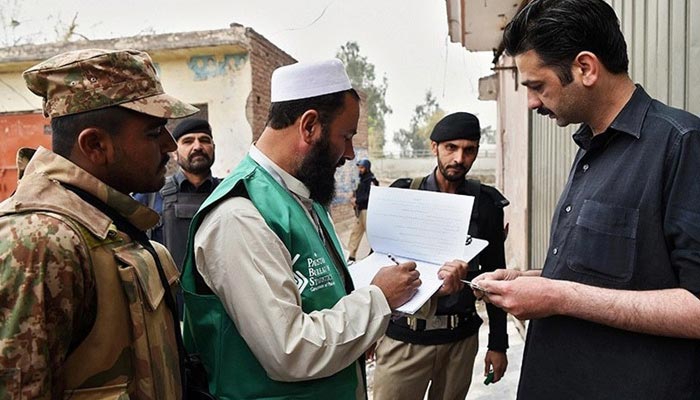First-ever digital population census in March
ISLAMABAD: Without having the requirement of Computerised National Identity Cards (CNICs) for verification purposes, Pakistan’s first-ever digital Population Census will collect data from 185,000 blocks in March 2023 whereby a 40-point questionnaire covering eight important areas’ details would be sought.
The 40-point questionnaire will seek information about eight broad areas in the upcoming population census exercise, including households, basic amenities, demography, education, health, employment, disability and migration.
Chief Statistician Pakistan Bureau of Statistics (PBS) Dr Naeem Uz Zafar said that Pakistan’s Census in 2023 is going to be digital for the first time ever in the country’s history. All the preparations are rolled out and the team is now ready for the gigantic task. “The effort is entirely indigenous; all the systems devised and the tools created are by our own experts,” he said.
He was addressing a seminar, themed “Census 2023: All You Want to Know About” at the Pakistan Institute of Development Economics (PIDE) Islamabad on Thursday. He said census is an important national activity that is linked with resource allocation to provinces, representation in National/Provincial assemblies and the delimitation process. Therefore, the credibility of the census is of utmost importance. This is what called for comprehensive introspection leading to a solution acceptable to all i.e. digital census.
He apprised the audience that after the results of latest Census 2017 were approved in the 45th CCI meeting held on 12th April 2021, the Council of Common Interests (CCI) gave directions for the next census to start as early as possible and which should be according to international best practices by using the latest technology. The Government of Pakistan then constituted a committee of renowned demographers and experts with comprehensive TORS to bring transparency, credibility, and wider acceptability of census processes and results. For this, a board-based stakeholders’ engagement was carried out in order to have ownership of the process.
Earlier, in his opening remarks, Dr Nadeem ul Haque, Vice Chancellor, PIDE, said that censuses remain controversial in Pakistan, at times delayed for over a decade. Now that we are moving toward the new census, it is time to raise all the concerns and questions we have.
“The Pakistan Bureau of Statistics (PBS) has estimated that there will be a total funding requirement of Rs34 billion for holding census exercise out of which Rs10 billion have been provided to PBS while they have requested the Finance Ministry to release the remaining amount of Rs24 billion,” said the top official sources while talking to The News here on Thursday.
Sources said for the first time, self enumeration facility will also be made available. Household geotagging will be done to accomplish the exercise. There will be 126,000 enumerators collecting data from 185,000 blocks from all over the country.
The army personnel will provide foolproof security to 90,000 enumerators while police personnel will also accompany the enumerators to provide security at the first stage. Then the army will deploy its Quick Response Force to ensure overall supervision of foolproof security of the whole census exercise all over the country.
Each enumerator will be responsible to collect data from two blocks in 30 days of March 2023. The PBS has already held a consultation with Director General Military Operation (DGMO) and the army showed its readiness to spare personnel for providing security.
The population census will be done on a de-jure basis as everyone will be counted where he or she stayed in the last six months and hold a plan to continue staying in the same place for the next six months.
-
 Polar Vortex ‘exceptional’ Disruption: Rare Shift Signals Extreme February Winter
Polar Vortex ‘exceptional’ Disruption: Rare Shift Signals Extreme February Winter -
 Which Countries Are Worst And Best In Public Sector AI Race?
Which Countries Are Worst And Best In Public Sector AI Race? -
 Matthew McConaughey Opens Up About His Painful Battle With THIS
Matthew McConaughey Opens Up About His Painful Battle With THIS -
 Emma Stone Reveals She Is ‘too Afraid’ Of Her ‘own Mental Health’
Emma Stone Reveals She Is ‘too Afraid’ Of Her ‘own Mental Health’ -
 China Unveils ‘Star Wars’-like Missile Warship For Space Combat
China Unveils ‘Star Wars’-like Missile Warship For Space Combat -
 King Charles Facing Pressure Inside Palace Over 'Andrew Problem'
King Charles Facing Pressure Inside Palace Over 'Andrew Problem' -
 Trump Refuses Apology For Video Depicting Obama As Apes Amid Growing Backlash
Trump Refuses Apology For Video Depicting Obama As Apes Amid Growing Backlash -
 Jesy Nelson Reflects On Leaving Girls' Band Little Mix
Jesy Nelson Reflects On Leaving Girls' Band Little Mix -
 World’s First Pokemon Theme Park Opens In Tokyo, Boosts Japan Tourism
World’s First Pokemon Theme Park Opens In Tokyo, Boosts Japan Tourism -
 Waymo Trains Robotaxis In Virtual Cities Using DeepMind’s Genie 3
Waymo Trains Robotaxis In Virtual Cities Using DeepMind’s Genie 3 -
 5 Simple Rules To Follow For Smooth, Healthy Hair
5 Simple Rules To Follow For Smooth, Healthy Hair -
 $44 Billion Bitcoin Blunder: Bithumb Exchange Apologizes For Accidental Payout
$44 Billion Bitcoin Blunder: Bithumb Exchange Apologizes For Accidental Payout -
 Katie Price Ends Public Feud With Ex Peter Andre After 16 Years
Katie Price Ends Public Feud With Ex Peter Andre After 16 Years -
 Apple May Bring ChatGPT And Other AI Apps To CarPlay
Apple May Bring ChatGPT And Other AI Apps To CarPlay -
 Meghan Markle, Prince Harry Likely To Attend Super Bowl Halftime Show 2026
Meghan Markle, Prince Harry Likely To Attend Super Bowl Halftime Show 2026 -
 AI Next Big Trial: Elon Musk Calls For ‘Galileo Test’ To Prove True Intelligence
AI Next Big Trial: Elon Musk Calls For ‘Galileo Test’ To Prove True Intelligence




